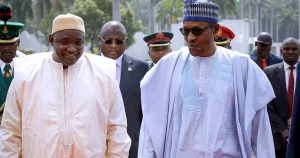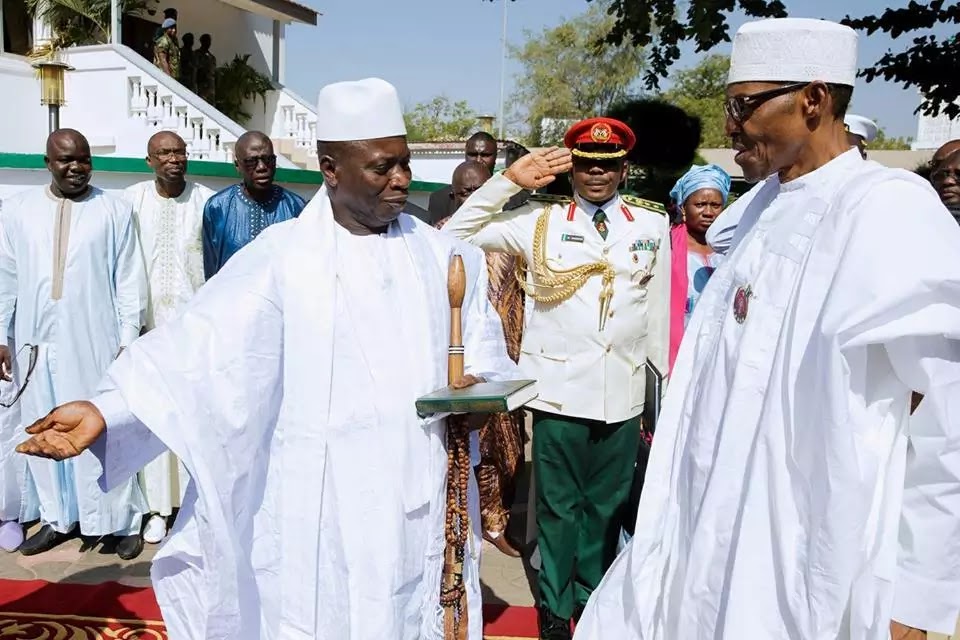Gambiaj.com – (BANJUL, The Gambia) – In moments of political crisis, gratitude is not only a moral virtue—it’s a diplomatic necessity. Both the Quran and the Bible emphasize the importance of thankfulness. In Surah Ibrahim (14:7), Allah says, “If you are grateful, I will surely increase you [in favor].” Similarly, 1 Thessalonians 5:18 advises Christians to “give thanks in all circumstances.” These teachings are not merely spiritual—they are deeply pragmatic. Acknowledging those who stood with you in times of uncertainty reflects the values of a nation.
As I was finalizing this article, the Office of the President announced that President Adama Barrow would travel to Nigeria to offer condolences following the passing of President Muhammadu Buhari. The gesture is commendable. At a critical moment in Gambian history, Buhari acted as a statesman and elder, helping steer the country away from the brink.
Barrow’s decision to pay tribute is not only appropriate—it is a necessary affirmation of political maturity and national memory. Indeed, the late Nigerian former president Muhammadu Buhari helped save The Gambia’s democracy. Let’s take a look inside the 2017 crisis and his role, the intelligence, and Barrow’s evacuation.
Buhari’s Role as Chief Mediator
Following Yahya Jammeh’s refusal to concede defeat after the 2016 presidential election, ECOWAS appointed Nigerian President Muhammadu Buhari as chief mediator, supported by Ghana’s President John Mahama and Liberia’s Ellen Johnson Sirleaf.
Buhari’s credibility as a former military leader and respected statesman lent weight to the mission.
He traveled to Banjul twice in January 2017, urging Jammeh to step down peacefully. His message was clear: regional solidarity, peace, and the futility of defiance.
Jammeh’s Legal Gambit and a Court in Crisis
On December 9, 2016, days after initially conceding defeat, Jammeh reversed his position and filed a petition with the Supreme Court. But the Court had lacked a quorum for over a year.
In an attempt to legitimize his challenge, Jammeh appointed six foreign judges, including Nigerians Abubakar Datti Yahaya and Emmanuel Akomaye Agim, and Sierra Leonean Nicholas Colin Browne‑Marke.
The move was widely rejected. The Gambia Bar Association dismissed the appointments, and ECOWAS insisted the election result was non-negotiable.
Diplomacy Adjusts to Legal Deadlock
The legal vacuum forced ECOWAS to recalibrate. With no credible judicial path forward, regional leaders doubled down on their insistence that Barrow was the legitimate president. Buhari’s continued engagement helped maintain pressure and coordination.
As the prospect of a peaceful exit waned, ECOWAS began preparing for military intervention and placed Barrow’s safety at the center of its strategy.
Jammeh’s Emergency Powers and Parliamentary Complicity
On January 17, 2017, Jammeh declared a 90-day state of emergency, which was swiftly endorsed by the National Assembly.
This extension granted Jammeh sweeping powers and extended the Assembly’s term. After his departure, the emergency was lifted on January 24, 2017, restoring constitutional normalcy and marking a break with authoritarian overreach.
The Dakar Evacuation: Securing Barrow
Amid credible threats to President-elect Barrow’s safety—including possible mercenary action—Nigeria’s Buhari and Senegal’s President Macky Sall arranged for Barrow’s evacuation to Dakar.

There, on January 19, 2017, Barrow was sworn in at the Gambian Embassy, giving legal force to his presidency and neutralizing potential threats at home.
Mercenaries and Parallel Forces: The Intelligence Picture
Intelligence reports indicated that Jammeh had mobilized former fighters from Liberia and Sierra Leone and stockpiled arms near his hometown of Kanilai.
Surveillance confirmed these risks. Even if not fully operational, the threat of an insurgency shaped ECOWAS’s risk assessments and reinforced the need for Barrow’s evacuation.
Shaping Strategy: The Psychological Impact of Potential Violence
Fears of urban clashes or guerrilla resistance in the Foni region heavily influenced ECOWAS’s calculus.
Evacuating Barrow clarified the mission: this was not a hostage rescue—it was a defense of democracy. His legal inauguration further legitimized the ECOWAS military presence.
Internal Fractures: Jammeh Loses Control
As the situation deteriorated, Jammeh’s grip on the state apparatus weakened. Inspector General of Police Yankuba Sonko publicly pledged allegiance to Barrow, signaling significant dissent within the security services.
Segments of the civil service and military followed suit. ECOWAS’s position strengthened as Jammeh’s isolation deepened.
The Fall: Jammeh Leaves, Immediate Threats Collapse
On January 21, 2017, under mediation by Guinea’s Alpha Condé and Mauritania’s Mohamed Ould Abdel Aziz, Jammeh agreed to leave power.
He departed for Equatorial Guinea, and anticipated resistance failed to materialize. Gambians welcomed the peaceful transition with cautious optimism.
The Gambia’s 2017 transition was not secured by goodwill alone. It was the result of strategic diplomacy, legal clarity, intelligence coordination, and regional military resolve.
Buhari’s leadership, Barrow’s evacuation, and ECOWAS’s unity under pressure ensured a peaceful handover of power.
As President Barrow visits Nigeria to honor the late Muhammadu Buhari, we are reminded that gratitude is not a political afterthought—it is a foundational principle of statecraft, diplomacy, and dignity.











2 Responses
Was John Mahama the president at the time?
He was defeated and assuring the interim before the new president took office